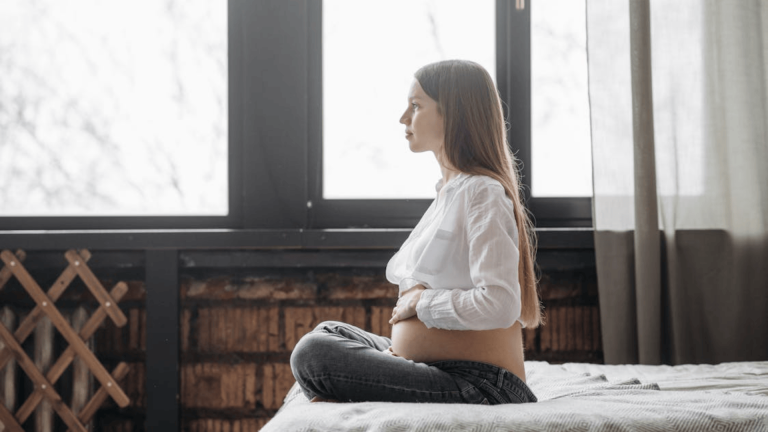Is it Normal to Have Cramping at 3 Months of Pregnancy?

Many expectant mothers worry about cramping during pregnancy.
If you’re three months pregnant and feeling cramps, you’re not alone. Cramping is common and often normal during this time.
However, it can be hard to know when to relax and when to be concerned.
This post will help clear up the confusion about cramping at this stage of pregnancy. It will explore the typical 3-month pregnancy symptoms, including common causes of cramping.
The article will also discuss when cramps might signal a problem that needs medical attention.
By the end, readers will better understand what’s normal and not when it comes to cramping in the first trimester.
Is Cramping Normal at 3 Months Pregnant?
Yes, cramping can be normal. When you’re three months pregnant, your body changes fast. Your uterus gets bigger to make room for your growing baby, which can cause discomfort.
The muscles and ligaments supporting your uterus are stretching, which can lead to cramping in your lower belly and back.
These cramps often feel a lot like the ones you get during your period. They might come and go throughout the day.
Simple things can set off these cramps. Moving around, being active, or even having gas or being backed up can cause them.
Normal Cramps in Early Pregnancy
1. Implantation Cramping
When you’re about three weeks pregnant, you might feel small twinges. This happens as the fertilized egg attaches to your uterus.
These cramps are usually mild and don’t last long.
2. Uterine Growth
As your pregnancy progresses, your uterus grows to make room for your baby. This can cause mild to moderate cramping in your lower belly.
It’s your body’s way of adjusting to the changes.
3. Digestive Issues
Pregnancy hormones slow down your digestion. This can lead to gas, bloating, and sometimes constipation.
These issues might cause cramping that feels like pregnancy discomfort.
4. Exercise
Staying active is good for you and your baby. But sometimes, exercise can cause mild cramps. If this happens, take a break and drink some water.
Listen to your body, and don’t push too hard.
Abnormal Cramping During Pregnancy
Ectopic Pregnancy
This happens when an egg grows outside the uterus. It causes strong pain on one side of your lower belly.
If you feel this, get medical help fast. It can be risky if not treated quickly.
Miscarriage
Bad cramps with heavy bleeding might mean a miscarriage. See a doctor right away if this happens.
They can check what’s going on and help you.
Preeclampsia
This can start after week 20. It causes high blood pressure and protein in your pee. You might feel pain in your upper right belly.
Your doctor will need to watch you closely if you have this.
These problems aren’t common, but knowing about them helps you get care if needed. Always talk to your doctor if something doesn’t feel right.
Managing Normal Pregnancy Cramps

- Hydration is key when you’re pregnant. Drink plenty of water throughout the day to prevent dehydration, which can worsen cramps.
- Rest is just as important. Your body is working hard, so take breaks when you need them. Don’t push yourself too much. It’s okay to slow down and take it easy.
- Warm baths can be a great way to relax and ease cramps. The warmth helps your muscles loosen up. Just make sure the water isn’t too hot.
- Changing how you lie down can also help. Try lying on your side with a pillow between your legs. This can relieve some pressure on your body and reduce cramping.
- Many moms-to-be find maternity belly bands helpful. These support your growing belly and can ease the discomfort from your expanding uterus.
When to See a Doctor
1. Persistent Severe Pain
If you’re feeling strong cramps that don’t go away, it’s time to call your doctor.
Normal pregnancy cramps usually come and go, but ongoing pain could mean something that needs attention.
2. Bleeding
Cramps, along with heavy or non-stop bleeding, are not typical. If you notice this, reach out to your healthcare provider right away.
They’ll want to check to ensure everything’s okay with you and your baby.
3. Unusual Symptoms
Trust your instincts. Don’t wait to contact your doctor if something feels off or if you have any symptoms that worry you.
It’s always better to check, even if it turns out to be nothing serious.
Remember, your doctor is there to help you through your pregnancy. Don’t hesitate to call if you’re unsure or worried about cramps or other symptoms.
Conclusion
Cramps during pregnancy can be worrying, but now you know that many types are normal.
Your body is changing to accommodate your growing baby, and some discomfort is part of the process.
Remember to stay hydrated, rest when needed, and try soothing techniques like warm baths.
However, it’s crucial to pay attention to your body. If you experience severe, persistent pain, heavy bleeding, or any symptoms that concern you, don’t hesitate to contact your healthcare provider.
They’re there to support you through this journey.
Every pregnancy is unique, and your feelings might differ from others. Trust your instincts and keep open communication with your doctor.
With the right care and attention, you can navigate these changes and focus on the exciting times ahead.
Frequently Asked Questions
How Can I Tell the Difference Between Normal Cramps and Contractions?
Normal cramps are usually mild and irregular. Contractions are more rhythmic and increase in intensity. If unsure, time them and call your doctor.
Can Certain Foods Help Reduce Pregnancy Cramps?
Foods rich in magnesium, like bananas and leafy greens, may help reduce cramps. Staying hydrated and maintaining a balanced diet are also important for overall health.






